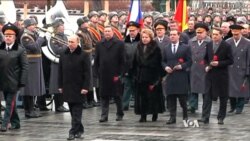Despite Russia’s crisis-hit economy, approval ratings for President Vladimir Putin are near record-highs. Western sanctions against Moscow have failed to curb what the West sees as Russian interference in Ukraine. Putin analysts say the former spy is determined to restore Russia to what he sees as its rightful place in the world - by any means available.
Marching solemnly to place a wreath at the tomb of the Unknown Soldier next to the walls of the Kremlin, President Vladimir Putin marked ‘Defender of the Fatherland Day’ Monday - a national holiday to honor Russia’s military victories and war veterans. But it was a strategic defeat - the fall of the Soviet empire in 1991 - that defines Putin’s vision, says Edward Lucas, author of the book The New Cold War.
“He feels that Russia was cheated in the 1990s and that the Soviet Union was humiliated and toppled by the West, and it’s time to get back what was lost, both in terms of status but also in terms of territory,” says Lucas.
‘A Putin dictatorship’
Western leaders say that vision is being rolled out in Ukraine and they accuse Putin of sending troops over the border - a charge the Kremlin denies. The West has enacted sanctions against several oligarchs close to Putin. They’ve had little effect, says Ben Judah, author of the Putin biography Fragile Empire.
“What that shows is that there aren’t any oligarchs anymore. There is a Putin dictatorship, and there are people who are completely dependent on him for their wealth or their role in Russian politics,” says he.
Judah says Vladimir Putin feels he is the only person who can lead and revive the Russian nation.
“Whether he needs to do that through war, he’ll do that through war; whether he needs to do that through economic growth, he’ll do that through economic growth. If the only way to do that is through nationalism and confrontation with the West, he’ll do that,” says Judah.
‘Ruthless and paranoid’
Vladimir Putin was an officer in the Soviet Union’s intelligence service, the KGB, rising to the rank of lieutenant colonel. That’s left an indelible mark, says Edward Lucas.
“He retains the ruthless and paranoid world view which is the hallmark of the KGB. He’s also come to love the limelight, and he’s gone from the shadows to being an international figure and he enjoys everything that comes with that,” says Lucas.
Despite such prominence, Putin admitted in a November interview with the state-run news agency that he has few friends.
“You know, I don't feel lonely, as strange as that may sound,” he told reporters. “Friendly meetings, contact - I don't have much, even with people whom I consider my friends,” said Putin.
‘Deeply isolated’
Such candor is rare. Putin has sought to project an image of masculinity. He was famously pictured without a shirt riding a horse, exploring a shipwreck in a mini-submarine and filmed flying a microlight aircraft alongside a flock of cranes. The image hides insecurities, says Ben Judah.
“Putin is a very lonely, very unhappy, deeply isolated man, terrified of physical decay, and a man who feels enormous self-pity that he has to bear this cross of Russia, that he has to confront these forces,” says Judah.
Analysts say such complexities are crucial to understanding the man behind the modern day Kremlin: a president and former spy determined to restore Russian power and pride at almost any cost.





